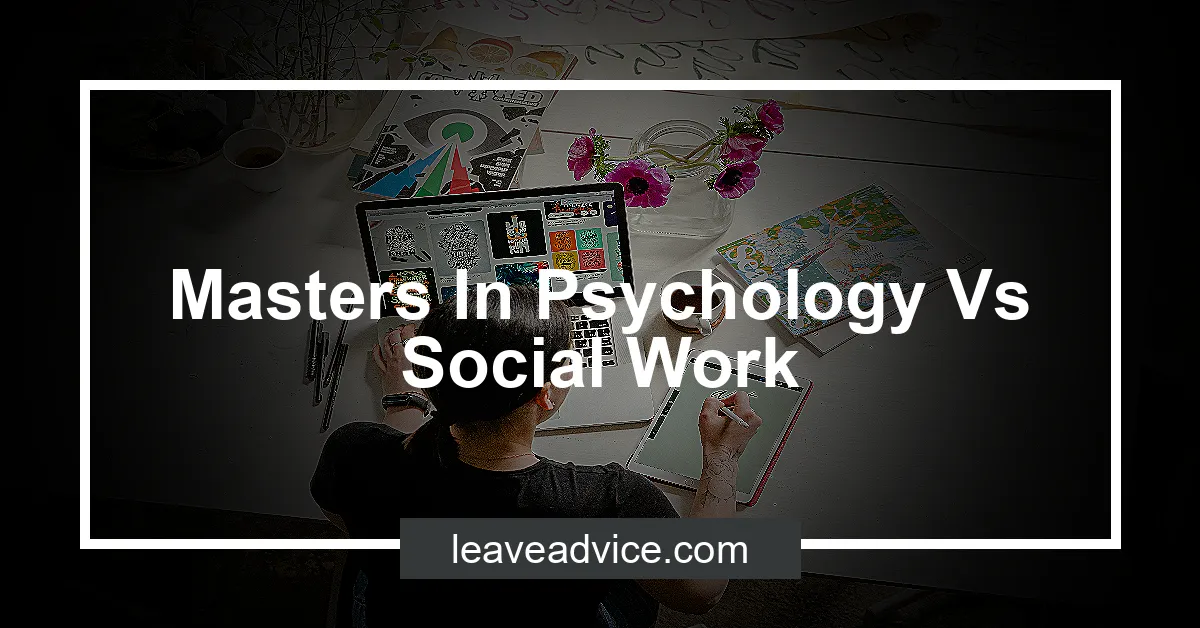Masters In Psychology Vs Social Work


In the field of mental health and human services, two popular graduate degree options are a Master of Social Work (MSW) and a master’s degree in psychology. These programs offer unique opportunities for individuals who are passionate about helping others and making a positive impact in their communities. While there are similarities between the two degrees, there are also key differences that can influence your career trajectory and the populations you serve. In this article, we will explore the distinctions between a Master of Social Work and a master’s degree in psychology, and help you determine which path is the best fit for you.
The Scope of Practice: A Broader Perspective in Social Work
One of the significant differences between a Master of Social Work and a master’s degree in psychology lies in the scope of practice. Social work encompasses a broad range of areas, including community mental health, child welfare, healthcare settings, substance abuse treatment, and more. By obtaining an MSW, you gain the knowledge and skills necessary to work with diverse groups of individuals, families, and communities, addressing their social, emotional, and economic needs. As a social worker, you can advocate for social justice, provide counseling and therapy, conduct research, and develop policies that promote positive change in society.
On the other hand, a master’s degree in psychology often focuses more on the study of human behavior and the underlying psychological processes. It provides a medical model perspective, allowing you to assess and diagnose individuals with mental health conditions. With this degree, you can work as a psychologist in various settings, such as hospitals, private practices, and research institutions. Psychologists primarily focus on diagnosing and treating mental disorders through therapy, counseling, and psychological assessments.
Career Opportunities: Counseling vs. Clinical Practice
Another crucial aspect to consider when choosing between a Master of Social Work and a master’s degree in psychology is the career opportunities available in each field. Both degrees can qualify you to work in counseling, but the specific roles and responsibilities may differ.
With an MSW, you can pursue a career as a licensed clinical social worker (LCSW) or a licensed professional counselor (LPC). As an LCSW, you can provide therapeutic interventions, case management, and advocacy services to individuals, families, and communities. You may work in a variety of settings, such as hospitals, schools, mental health clinics, and nonprofit organizations. On the other hand, an LPC focuses primarily on providing counseling services, helping clients manage mental health issues, relationship problems, and personal crises.
With a master’s degree in psychology, you can become a licensed psychologist and specialize in clinical practice. Psychologists are trained to administer and interpret psychological assessments, provide therapy and counseling, and conduct research to advance the field of psychology. They often work independently or as part of a multidisciplinary team in hospitals, private practices, academic institutions, and government agencies.
Duration and Program Structure
When it comes to the duration and program structure, there are similarities and differences between an MSW and a master’s degree in psychology. Typically, both programs can be completed in 2 to 3 years, depending on the school and the number of classes taken per semester.
An MSW program typically includes a combination of classroom instruction, fieldwork or internships, and a supervised clinical experience. This blend of academic coursework and hands-on training prepares social work students for the diverse challenges they may encounter in their future careers.
A master’s degree in psychology also involves coursework and practical training, but the emphasis is more on research and theoretical knowledge. Students in psychology programs often conduct research studies, write scholarly papers, and present their findings at conferences. They may also have the opportunity to gain practical experience through supervised clinical internships.
Conclusion: The Best Choice for You
In conclusion, both a Master of Social Work and a master’s degree in psychology offer valuable knowledge and skills for individuals interested in the field of mental health and human services. If you are passionate about making a tangible difference in the lives of individuals, families, and communities, pursuing an MSW can provide you with a broader scope of practice and opportunities to address social justice issues. On the other hand, if you are more inclined towards diagnosing and treating mental disorders through therapy and psychological assessments, a master’s degree in psychology may be the better fit.
After careful consideration of the similarities and differences between these two degrees, our recommended product for further exploration is the Master of Social Work (MSW) program. With its emphasis on social justice, advocacy, and a broader scope of practice, the MSW program provides a more comprehensive foundation for a career in the field of mental health and human services. You can find further information about the Master of Social Work program on Amazon here.


Disclaimer: The author of this article is not affiliated with any specific product or service mentioned in this blog. The recommendation provided is based solely on the comparison between the Master of Social Work and a master’s degree in psychology.

